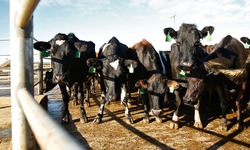
Andrew Wilkie says opponents of Van Diemen’s Land Company’s sale to Moon Lake Investments were ‘right all along’
Mass resignations at Chinese owner of Australia's largest dairy farm cast doubt on investment
by Christopher Knaus
A mass board resignation at the Chinese firm that bought Australia’s largest dairy farm has fuelled concerns it may not fulfil the promises of local investment and environmental protection that convinced the Turnbull government to sign off on the sale.
Moon Lake Investments attracted scrutiny in 2015 when it offered $280m for the Van Diemen’s Land Company, which owned Australia’s largest dairy farm in north-western Tasmania.
The decision required the green light from the foreign investment review board and the Turnbull government agreed to the sale in February 2016, saying Moon Lake had met the “national interest” test.
That was, in part, because Moon Lake had promised to create 95 local jobs, invest $100m into the local industry and make commitments to help protect the endangered Tasmanian devil.
On Wednesday, the Australian non-executive directors of Moon Lake Investments and its chief executive staged a mass resignation. David Crean, Rob Poole, Simon Lyons, Keith Sutton, and Bruce Donnison all resigned on Monday, and the chief executive, Evan Rolley, said he would not extend his contract beyond 30 June.
• Sign up to receive the top stories in Australia every day at noon
Crean, a former Tasmanian state treasurer, issued a statement saying the company’s owner, Xianfeng Lu, had rejected a proposal from the board to invest significantly in irrigation and water storage on the farms, to mitigate the impact of any future drought.
Crean said the directors could not agree with a planned restructure of the company proposed by Lu. The restructure would put VDL under the ownership of a holding company, which would in turn be owned by Ningbo Xianfeng New Material Co Ltd (APlus), which is listed on the Shenzhen stock exchange.
Advertisement
“Under the restructure Mr Lu will be the CEO of all of the companies including the VDL farms, and running that with a general manager,” Crean said. “We said to him that was not acceptable, that you needed a dedicated CEO to run the VDL farms.”
The Tasmanian independent MP Andrew Wilkie said it appeared that all of the “miraculous promises are unravelling about the selling of VDL to the Chinese”.
He told Guardian Australia it appeared the promised investment in new infrastructure was not being realised, that lots of new jobs were not being created and that “presumably” environmental improvements were not occurring.
“Instead Australia’s biggest dairy producing asset has become just another Chinese mass production centre for low-value products,” Wilkie said. “No wonder the Australia board is bailing out. Those who opposed the sale were right all along.”
Sign up for Guardian Today Australian edition: the stories you need to read, in one handy email
Read more
Lu, in a statement to ABC and News Corp, said the restructure had been approved by the foreign investment review board and would allow the group to become a “vertically integrated” dairy business that can sell products in Australia and abroad.
“We are of the view that the corporate governance structure of the Australian operations needed to change in order to best achieve these strategic goals,” he said. “However, given the restructure and proposed new governance structure, the non-executive directors and the CEO of VDL Farms agreed to part ways.”
The federal agriculture minister, David Littleproud, issued a short statement to Guardian Australia when asked about the mass resignation.
He said: “It’s important foreign investment review board conditions are taken seriously.”
Australia’s biggest dairy producing asset has become just another Chinese mass production centre for low-value products.
Andrew Wilkie
One of the promises made by Moon Lake when it bought the VDL farms was to give “in principle” support for the construction of a “devil proof” fence at its Woolnorth property. The fence was to provide sanctuary for the endangered Tasmanian devil and help prevent the spread of the deadly devil facial tumour disease.
The Tasmanian Conservation Trust director, Peter McGlone, said the promise was simply spin, which was not adequately questioned by media at the time.
Advertisement
All the company had offered was to agree to a fence being built if the state government wished to build one.
“They were not going to pay for it, it was the state government,” McGlone told Guardian Australia.
McGlone said the fence, even if it was realised, would do little to help the endangered species. That was because the many creeks on the vast property would allow the devils to bypass it easily. The fence would also require land clearing, which would take away habitat.
“The other challenge is that you would almost certainly need a double fence, to provide a surety against one fence failing,” McGlone said. “If you put all those things together, it’s a very expensive fence, very complicated, not assured of actually enclosing the devils, then on top of that you’ve got all the maintenance costs.”
Discussions of the fence tended to ignore a more important point about the site, McGlone said.
“The promises about the fence, it’s really frustrating that they always seem to overshadow the fact that they have a permit from the state government to clear 1,800ha of devil habitat,” he said.











